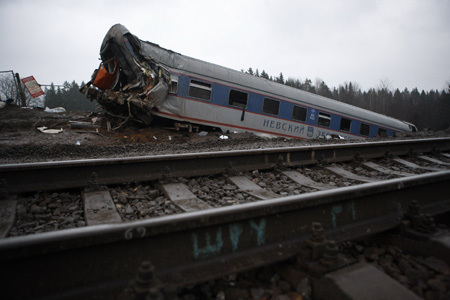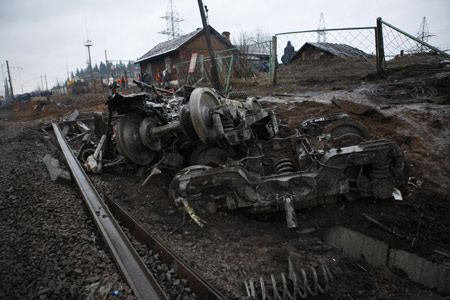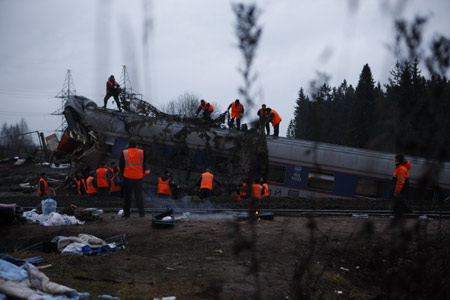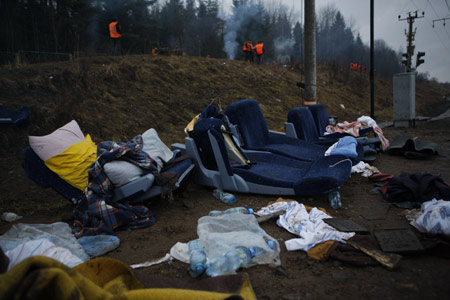Europe
Terrorist bombing feared behind Russia train derailment
(Xinhua)
Updated: 2009-11-29 15:13
MOSCOW: Russian intelligence officers said Saturday that the derailment of a luxury train that killed at least 26 people and injured dozens more was caused by a bomb blast.
The Nevsky Express, en route to St. Petersburg from Moscow, derailed Friday night near the town of Bologoye on the border between the Tver and Novgorod regions.
The 14-car train was carrying 653 passengers, including three foreigners, and 29 crew members. The Chinese embassy in Moscow told Xinhua that it has not received any reports of any Chinese citizens being injured in the derailment.
The derailment was caused by a homemade bomb equivalent to 7 kg of TNT, Federal Security Service chief Alexander Bortnikov said.
"Indeed, this was a terrorist attack," said Vladimir Markin, a spokesman for the Investigative Committee of the Prosecutor General's Office.
|
|
A crater 1.5 meters in diameter and 0.7 meters deep was found at the scene.
"Presumably, an explosive device was detonated on the train route," Markin said.
Vladimir Yakunin, president of Russian Railways, also said there was objective information indicating the train was derailed with unidentified explosives.
|
|
The details of Friday's explosion were quite similar to those of a previous accident, Yakunin said.
"Witnesses heard a loud bang before the accident. All this could point to a possible attack," the Interfax news agency earlier cited an unnamed law enforcement source as saying.
The exact number of casualties remained undetermined as reports on the death toll varied.
|
|
Health and Social Development Minister Tatyana Golikova said 26people have so far been confirmed dead in the derailment, with another 18 people unaccounted for, and nearly 100 injured. A spokeswoman for the Russian Prosecutor General's Office, meanwhile, put the death toll at 30.
Markin confirmed that 26 people had been killed and said the identification of victims would soon begin. Among the victims was Boris Yevstratikov, head of Russia's Federal Reserve Agency, Interfax reported, citing the official's relatives.
The route between Moscow and St. Petersburg, Russia's second largest city, is heavily traveled by tourists and business people. The luxury train was popular with government officials and business executives.
President Dmitry Medvedev has ordered the payment of compensation to the families of those affected by the derailment.
| ||||
The injured will get 50,000 to 100,000 rubles (about US$1,725 to 3,450), depending on the severity of their wounds.
If terrorism was confirmed, the derailment would be Russia's most deadly terrorist attack outside the troubled North Caucasus region in recent years.
Authorities are searching for the people suspected of the bombing, which they believed had been planned for at least a month.
In August 2007, an explosion derailed the same express train on the same railroad line, injuring 60 people. An investigation into that attack continues, with the main suspect still being sought by authorities.
Once rampant attacks in Russia have declined significantly since Moscow largely subdued rebels in the turbulent North Caucasus republic of Chechnya, which has experienced two bloody wars in the past 15 years. The Kremlin formally ended its anti-terrorist operation in Chechnya in April.
















